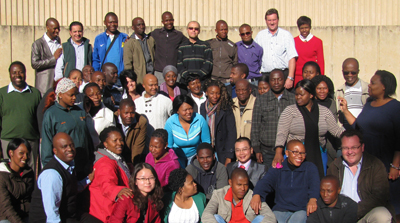Short course in population, environment and development draws participants from across the world
 |
Participants at this year’s short course in the Population, Environment and Development (PED) nexus.
4 September 2013 |
In 2006 the university, in collaboration with several national and international partners, such as the Department of Social Development (DSD), Leadership for Environment and Development (LEAD): Southern and Eastern Africa, the United Nations Population Fund (UNFPA), and South African National Parks (SANParks, particularly Golden Gate Highlands National Park), launched a short course in the Population, Environment and Development (PED) nexus. Since 2006 a total of ten courses were presented and more than 300 mid-career managers, senior officials and NGO volunteers from across the world received training. The most recent course included participants from Vietnam, China, Tunisia, Gambia, Zimbabwe, Mexico and Uganda.
Colleagues from several academic departments and centres at the UFS – Sociology, Environmental Management, Development Studies and Disaster Management, in collaboration with the DSD and LEAD – gave theoretical inputs during the course, while colleagues from SANParks were primarily responsible for the facilitation of the practical visit on site. The PED nexus training programme has received international recognition as a best practice example of successful initiatives of this kind.